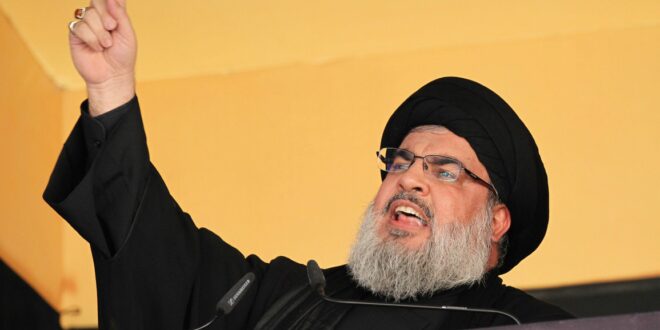Lebanon’s Hezbollah confirmed on Saturday that its leader Hassan Nasrallah was killed in an Israeli strike on south Beirut.
Hezbollah chief Hassan Nasrallah has been killed, the Lebanese movement said Saturday, dealing a heavy blow to the Iran-backed group that has been engaged in a year of cross-border hostilities with Israel.
Hezbollah’s statement confirms earlier announcements from Israel’s military that they had killed Nasrallah in an air strike on Beirut’s southern suburbs, in a move that could destabilise Lebanon as a whole.
“Sayyed Hassan Nasrallah, Secretary General of Hezbollah, has joined his great, immortal martyr comrades whom he led for about 30 years,” Hezbollah said in a statement.
Rarely seen in public, Nasrallah enjoyed high regard among his mainly Shia Muslim supporters, and was the only man in Lebanon with the power to wage war or make peace.
Before his death was confirmed, a source close to Hezbollah told news agency AFP contact with the group’s leader had been “lost” since Friday night.
“Hassan Nasrallah is dead,” Israeli military spokesman Lieutenant Colonel Nadav Shoshani had announced earlier on X.
Another military spokesman, Captain David Avraham, told AFP the Hezbollah chief had been “eliminated” in Friday night strikes on Beirut.
Iran’s supreme leader Ayatollah Ali Khamenei on Saturday condemned what he called Israel’s “short-sighted” policy in the region.
“The massacre of the defenceless people in Lebanon once again… proved the short-sighted and stupid policy of the leaders of the usurping regime,” Khamenei said in a statement, without mentioning Nasrallah’s fate.
Hezbollah began low-intensity cross-border attacks a day after its Palestinian ally Hamas staged its unprecedented attack on Israel on October 7.
Israel has over the past few days shifted the focus of its operation from Gaza to Lebanon, killing over 700 people in heavy bombing and displacing around 200,000.
Israel’s army chief Lieutenant General Herzi Halevi on Saturday said: “The message is simple, anyone who threatens the citizens of Israel — we will know how to reach them.”
The military also said “most of the senior leaders of Hezbollah have been eliminated”, after having announced earlier the deaths of Hezbollah commanders Muhammad Ali Ismail and Ali Karake, among others.
Widespread destruction
The military added that it had hit over 140 Hezbollah targets in Lebanon since Friday night.
It continued to pound Hezbollah’s south Beirut stronghold into Saturday, sending panicked families fleeing.
One strike hit the second and third floors of a building, a Lebanese security official said.
According to an AFP correspondent, dozens of buildings have been destroyed.
The blasts that rocked southern Beirut late Friday were the fiercest to hit the area since Israel and Hezbollah last went to war in 2006.
In the Haret Hreik neighbourhood, there were craters up to five metres (16 feet) wide.
Middle East expert James Dorsey described Friday’s attack as “very sophisticated”, adding it “demonstrates not only significant technological capacity but just how deeply Israel has penetrated Hezbollah”.
Before it was confirmed, Iranian media downplayed the report from Israel of Nasrallah’s death, describing it as “rumours”.
Posters of Nasrallah were erected in Tehran bearing the slogan “Hezbollah is alive”.
Israeli military spokesman Shoshani later said there was “still a way to go” in Israel’s fight against Hezbollah, adding that it was believed to have “tens of thousands of rockets”.
People sleeping on the streets
After Friday’s heavy strikes, Israel issued fresh warnings for people to leave part of the densely populated Dahiyeh suburbs before dawn.
Hundreds of families spent the night outside, in central Beirut’s Martyrs’ Square or along the seaside boardwalk.
South Beirut resident Rihab Naseef, 56, slept outside a church.
“I didn’t even pack any clothes, I never thought we would leave like this and suddenly find ourselves on the streets,” Naseef told AFP.
Israel’s military also announced strikes Saturday on the Beqaa area in eastern Lebanon and on the south.
It said a surface-to-surface missile fired from Lebanon fell in an open area in central Israel and another was intercepted in the north.
Early Saturday, Hezbollah claimed a rocket attack on kibbutz Kabri in northern Israel.
It later said it launched “a salvo of Fadi-3 rockets” towards the Ramat David airbase in northern Israel.
Israeli Prime Minister Benjamin Netanyahu has rejected calls for a ceasefire, vowing to keep up deadly airstrikes.
“Israel has every right to remove this threat and return our citizens to their homes safe,” he said.
 Eurasia Press & News
Eurasia Press & News




